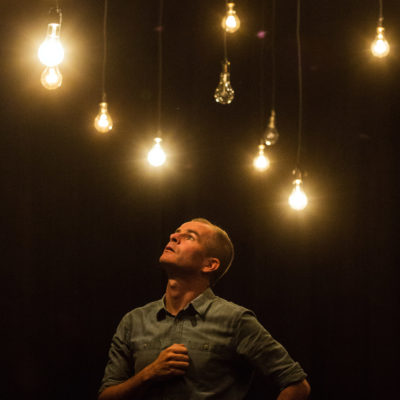
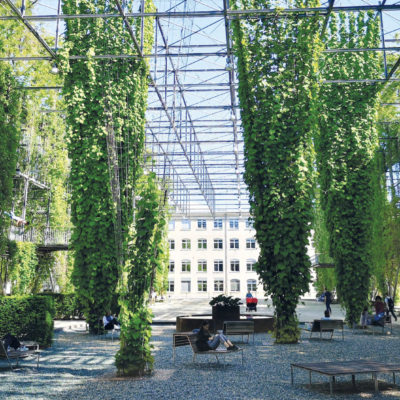
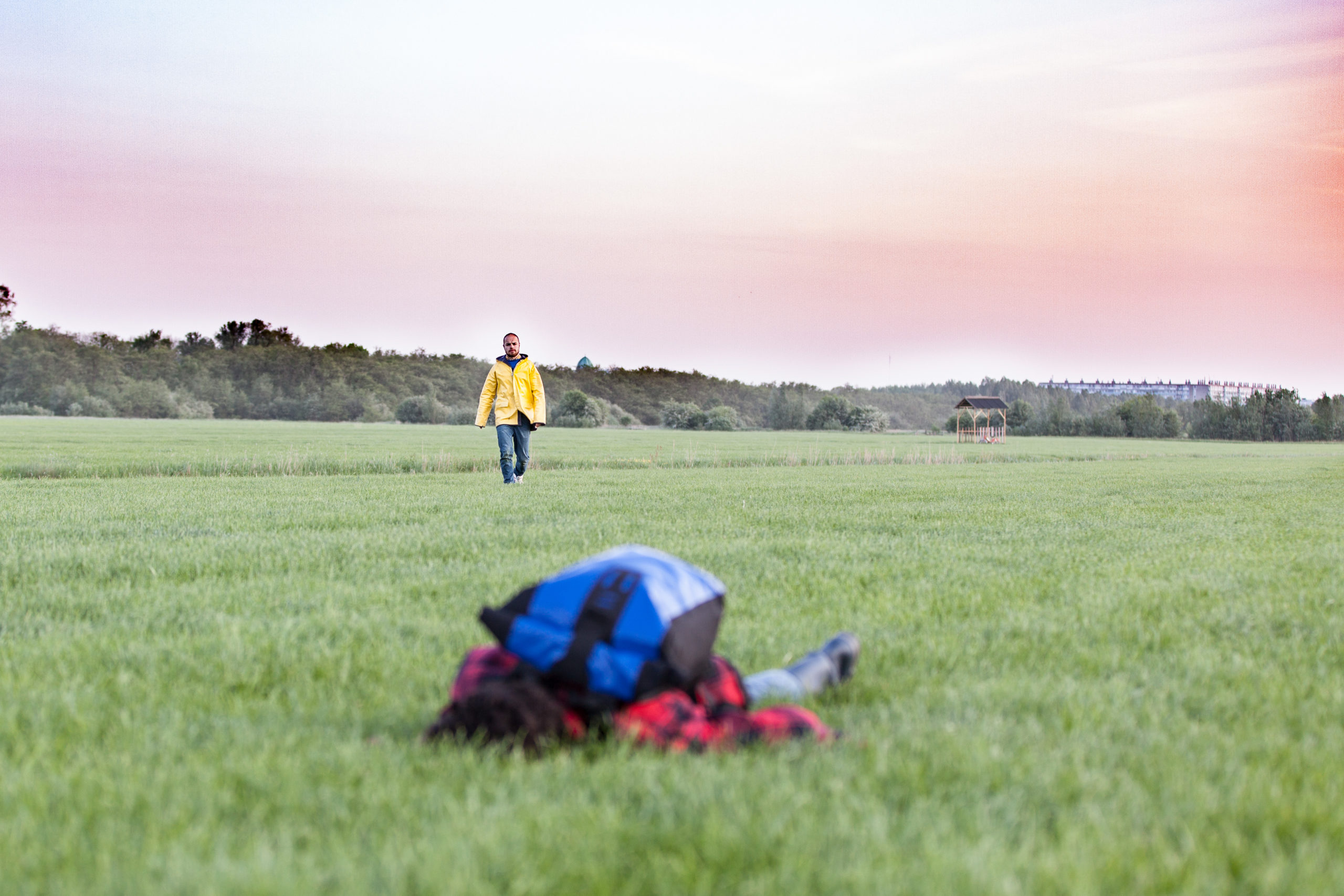 Re-enactment of the Now (c) Roel van Berckelaer
Re-enactment of the Now (c) Roel van BerckelaerSince ACT is about making a change, we need to talk about impact. We must learn about the sorts of impact art can make, about the role and place of impact in art practices, and about how art practices themselves are impacted, for instance by Covid-19.
Therefore, as part of the Learning to Impact Work Package of the ACT project, we research the many faces of impact. We do so by interviewing artists. With The Interview Series we tap into their embodied, concrete artistic practices. We want to build an understanding of how these practices (may) evolve in the face of the current challenges. How the artists learn to ‘stay with the trouble’. How the urgency of climate change, ecology and biodiversity informs their attitude towards the social impact of their artistic work.
Davy Pieters’ work is hard to pin down. Blurring the lines between theatre and performance, between present and future, between reality and ‘what if’, and between styles of representation, Davy creates scenarios where the audience feels compelled to reflect on its own (in)action in the light of developments in society. We are shocked into thinking. Davy Pieters: “As a director I literally have a stage and I get to use the audience’s time. I have a responsibility to use both well.”
I take great interest in new technologies and how they could play out. Currently I am working on a piece in four parts, in which I explore technological developments using future scenarios. I am not so much interested in getting the future right as I am in literally staging hypothetical situations: “what if this was the world we’d find ourselves in?” That scenario then serves as the starting point for conversations in the present: what are we to do, here and now?
One of the technologies that has caught my attention is CRISPR Cas-9, which basically allows us to cut and paste genetic material. We need to come to grips with this technology and the questions it raises. What are the consequences of being able to design the genetics of future generations? What will count as the standard for ‘better’ human beings? How to treat human beings that deviate from the norm? Where and how does inequality come into play?
I don’t want to take the moral high ground and tell the audience what to think. Instead, I offer scenarios and perspectives that the audience can relate to by humanising these technologies. Make CRISPR tangible, something you can relate to. I plan to do a play on parents who have ‘chosen’ their kids in the light of the opportunities CRISPR offers. Starting from that scenario you can raise the question what it would be like for a child to know that its parents designed it that way. I create a stage in which we can collectively explore meaningful questions to get a better sense of where we stand. But of course, I am not neutral myself, nobody is. It is thin line between addressing a topic and speaking out. That’s a constant challenge.
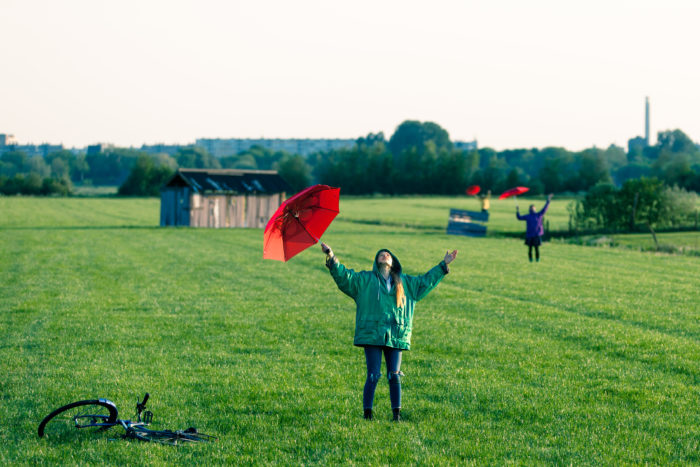
Re-enactment of the now was about climate change. More specifically about our lack of action in spite of all the information available to us. Re-enactment of the now was an outdoor, site-specific play in which future generation human beings re-enact the year 2016. The play presents the audience with a future state in which their country and their homes are consumed by the water. The performance draws a direct line between that future scenario and the question of what to do at this moment in time. In making that connection, in linking the future to a present in which we can act, I wanted to create a shocking experience for the audience. This experience can motivate to act.
I think a lot has changed since then. I believe that in general we are much more aware of the gravity of the situation. Climate change is becoming more and more palpable. Global warming is very real. Islands are disappearing. The problem is staring us in the eyes. And yet, there is still inaction. I think the artist is in a position to create spaces to reflect on this urgency. To stand still and reconnect with our state of being.
My most recent work DO NOT LOOK BACK WITH REGRET is about mortality. Humans like to think that they are in control, that they are masters of the situation. Corona taught us that we are very mortal. The same goes for the way that we treat the environment. We treat it like an inexhaustible source. It is not. We need to change our perspective and realise that we are mortal beings in a finite world. Only then we will treat it with greater care. DO NOT LOOK BACK WITH REGRET is about death, loss, about saying goodbyes. It is an invitation to stop running, face the situation, and reflect.
As a director I have a stage to work on, and the audience offers me its time. To me, that comes with a responsibility to make room for something that is currently missing. With every project I ask myself the question: ‘what is needed here?’, and then work from there.
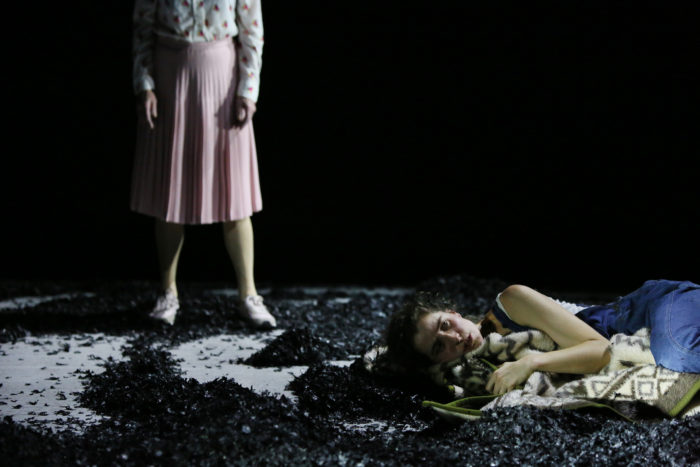
Traditionally, there’s the play and then there is the conversation with the audience afterwards. Pretty standard and straightforward. In a way it is a shame that soon after the performance, the conversation comes to a stop. I would really like for the dialogue that is triggered by the play to linger for a longer period of time.
My ambition is to extend and enrich the engagement with the audience. Get more people on board in the production process and find ways to ensure that the play itself falls on fertile ground. That the play keeps on playing, so to say.
Artists can play an important role in bridging different worlds. As an artist staging fictional futures, I can envision the social consequences of the emerging technologies. With my earlier work, I got questions from people working in tech firms, asking me to give a talk on the technology I was exploring at the time. With the piece on CRISPR, I would very much like to work with scientists working in that field. They have much to offer to the production process. And scenarios I visualise can contribute to the debate whether we want to go to a certain future or not.
I find impact a difficult concept. In a way anything you do makes an impact, even unintentionally so. But how do you know what kind of impact you make? And how do you measure that? It is more important to realise that the making of the play, the play itself and what happens afterwards are all connected. For me personally, the ambition to actively engage the audience has come with the years. Merely focussing on the performance feels a bit too non-committal. Engaging the audience shows that you take them seriously.
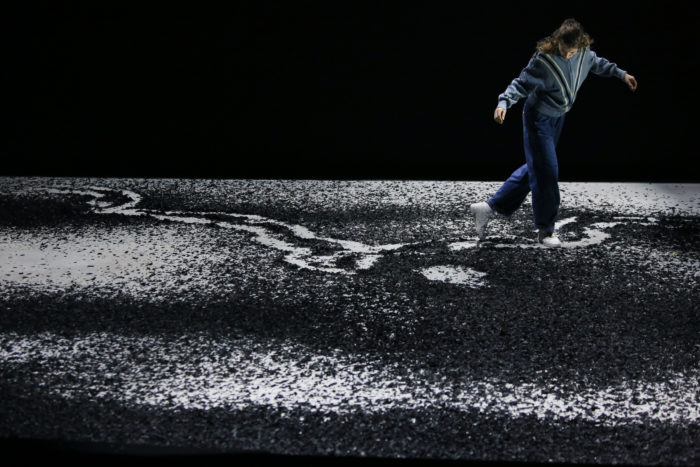
Follow Davy’s work via http://davypieters.com
This is the third article in The Interview Series on Impact.

